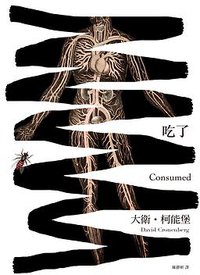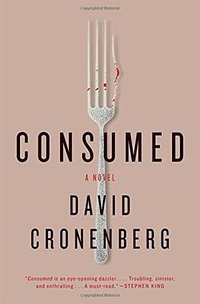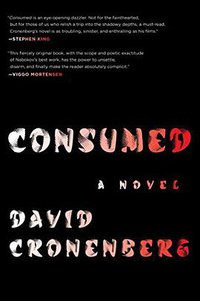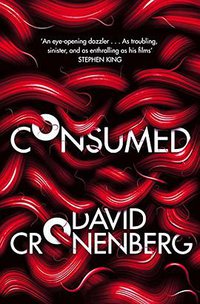Consumed
Douban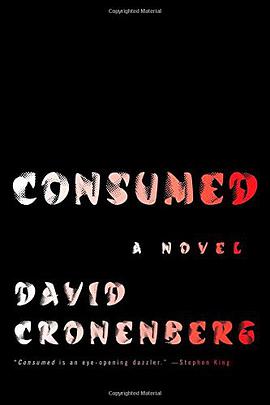
A Novel
David Cronenberg
Übersicht
Editorial Reviews
Amazon.com Review
Guest Review of Consumed by Bruce Wagner
Chelsea Cain
Photo Credit: Myrna Suarez
Cheryl Strayed
Photo Credit: Caitlin Cronenberg
Gore-igami
To say that David Cronenberg’s radically poetic, necromantic, numinous, homicidally erotic first novel—if one may call it that because for me his entire oeuvre is novelistic—is about cannibalism would be like saying Borges’ work is about libraries or Escher’s prints are about crows and staircases. (A character making an off-stage appearance in Consumed is Sagawa, the true-life necrophiliac and murderer who cannibalized a woman in Paris and became a Tokyo celebrity after his extradition and release. He went on to write restaurant reviews. All of which makes Cronenberg’s deliriously serpentine narrative more than plausible.) Yet Consumed is a companion to those weltanschauungs, in that it rapturously finger-paints the hallucinatory avalanche of information in our time and how we enter the river of streaming data to emerge from those waters consecrated in the New Dream—the scary, brave old world of unfathomable morphing realities. In this way it resembles Borges’ prophetic “Internet” story, “Tlön, Uqbar, Orbis Tertius” and even “The insects of M.C. Escher” (cf. Cultural Entomology Digest. As in many of the great director’s explorations, insects buzz large in Consumed as well). This novel is ultimately about the human scanner devouring image and text, thus becoming transformed. Like the Ouroboros symbol of the snake consuming its tail, the reader of fiction chases and eats what inexorably becomes its (our) own Tale; the reader-cannibal of Consumed rips out the beating art of the reflected warrior and becomes a hyperlink. One of the characters muses, “But also we realized we needed the net in order to understand what was the basic human condition, what a current human being really was, because we had lost touch with that, our students made that clear to us, and so we were also using the Internet to research our roles playing normal human beings.”
L’Internet, c’est nous. What else is nous?
Aside from all that, Consumed is great fun—a blistering read, crazy sexy, and insanely funny, too. The charismatic celebrity-philosopher couple at its center is Célestine and Aristide Arosteguy—a hilarious riff on Sartre and de Beauvoir; why hasn’t anyone done this before?—and a pair of young journalists/lovers who fatefully converge to unravel Célestine’s mysterious murder in Paris. (A few of the Arosteguy’s lauded works are Science-Fiction Money, Apocalyptic Consumerism: A User’s Manual, and Labor Gore: Marx and Horror.) They sleep with their student-acolytes and as faces of the theory of “Evolutionary Consumerism” are heroes on the world stage. Listen to Célestine: “When you no longer have any desire, you are dead. Even desire for a product, a consumer item, is better than no desire at all. You can see this in the youngest babies. Their desire is fierce. That’s why we say that the only authentic literature of the modern era is the owner’s manual.”
A hilarious sequence takes place at the Cannes Film Festival, where the Arosteguys are on the jury for the main competition. (Cronenberg himself was famously awarded the Special Jury prize for Crash in 1996, for “audacity,” and was President of the festival Jury in 1999.) This section is as pitch perfect as anything of Edward St. Aubyn’s in his recent satire of the Man Booker, Lost for Words. “We were on the jury at the Cannes Film Festival,” recounts Aristide, “the only two members who were not moviemaking professionals. The year before, it had been an American opera singer and a computer-game designer. Sequestered in a deluxe villa in the hills overlooking Cannes, we were to discuss in the most leisurely and free-form manner all questions of cinema and society with our nine jury colleagues—including our president, the Serbian actor Dragan Štimac—while eating the most exquisite meals and wandering the most Arcadian gardens. . . . There was on our jury an aged, angry, exiled North Korean director, Bak Myun Mok. He was not small, Bak Myun Mok, but he was arrogant and therefore slow and unprepared for my attack. Because we were not allowed to bring cameras and cell phones to our retreat, there are no photographs or videos of the expression of my rage, though the aftermath—Bak’s broken cheek-bone, his black eyes, his shredded lower lip—was duly recorded by the police photographer summoned to the villa. . . . Suffice it to say that the voting procedure was quite irregular, the palmarès was a satisfactory pandemonium, and the North Korean film won a Special Jury Prize—for ‘artistic subversion and visual elegance’—in consolation.”
The action spans from Hungary to Toronto to Paris to North Korea and includes incestuous partners: Nathan, a journalist with aspirations to be published in The New Yorker’s Annals of Medicine who contracts a once-timely-now-passé STD (Roiphe’s Disease) while doing a profile on a dodgy artist-surgeon, and his lover Naomi, an intrepid techie-gamine in the middle of an Internet investigation of the apparent murder of Célestine Arosteguy; Dr. Roiphe and his mysterious daughter, who are both engaged in exotically cryptic experimentation on each another in his pristine Toronto dollhouse/hothouse; there’s even a nod to Simon Sheen AKA Shin Sang-ok, a (again, true-life) South Korean director who along with his actress wife was kidnapped by Kim Jong-Il in 1978 in order to make movies at the Eternal President’s pleasure. Body-perception disorders, communication from the insect kingdom through high-end hearing aids, false identity and complete loss—consumption—of identities, apotempnophilia (see Cronenberg’s Consumed-related short film “The Nest,” marvelous essay-like musings on jealousy and possession, the blurring of bloodlines and the smearing of blood in the totalitarian politics of family and eros, the fetishization of both disease and cure, the origami of desire fostered by language and mystery, the literal geography of escape that always seem to lead back to the same country (same hyperlink)—the Ouroboros of the Web devouring its tail as we consume the information that has become ourselves—are just some of the threads that weave through Cronenberg’s impossibly possible tapestry of au courant fears and reactions to the all-consuming Now.
I’ve heard of a syndrome that affects the caregivers of partners with Alzheimer’s; in time, they begin a slow, barely perceptible descent into an alternate reality forged by the agonies of empathic adaptation. In this sense, Consumed is a chamber play of folies à deux that are in themselves a metaphor for what is happening to each of us because of prolonged exposure to the virus of technologically enhanced evolution and our inability to keep up. We adapt, but the flavor of that adaptation becomes an encroaching madness that Cronenberg has transcribed, vivisected and somehow—here’s his great, astonishing trick—exalted.
The rapture of the Deep Data.
“If the lie was complex and enthralling—and it was, it was—then there might be a book in it, with the ever-present desire to dig for the chimerical truth driving it on, providing the suspense, and no need ever to certify that truth.”
In Consumed, he’s done just that, and something more:
The truth has arrived, and it’s certifiable.
Review
"Consumed is an eye-opening dazzler. Not for the fainthearted, but for those of us who relish a trip into the shadowy depths, a must-read. Cronenberg's novel is as troubling, sinister, and as enthralling as his films." (Stephen King)
"Classic Cronenberg! Who else can tell such a frightening, thrilling, shocking story about the nexus of the spirit and the flesh? Consumed will, well, consume you." (J. J. Abrams)
"Coming from David Cronenberg, the originality, wit, preoccupation with technology, and uncompromising carnality of Consumed should come as no surprise. He will probably be accused of every sin that can be invented to compensate for human fear of mind and body. This fiercely original book, with the scope and poetic exactitude of Nabokov's best work, has the power to unsettle, disarm, and finally make the reader absolutely complicit." (Viggo Mortensen)
"An astonishing, seamless continuation of what I call his peerless novelistic film oeuvres. With Consumed, he has become the definitive heir, not just of Kafka and Borges, but of Cronenberg himself." (Bruce Wagner)
“Cronenberg may be best known for his films, but this cool, unsympathetic examination of self-absorbed intellectuals shows that his skills as a prose author are not to be discounted. . . . Readers will find it impossible to look away from the grotesque spectacle.” (Publisher's Weekly)
“Cronenberg is a gangbusters novelist. His dense, aristocratic prose is saturated with details of technology, sex, and disease . . . and every salacious bit is elevated to a thing of perverse beauty. Let’s hope Cronenberg makes this book-writing thing a priority." (Booklist)
"Cronenberg's approach to narrative is sturdy and direct... His originality is in what he’s driven to show you, the fierce sculptural intensity of his details and his willingness to linger." (Jonathan Lethem New York Times Book Review)
“Consumed does not disappoint. It compiles a lifetime of obsessions and observations about the merging of man and machine, the fascinating horrors of metamorphosis, the intertwining of sex and death, the anatomy of rage, and the mechanics of social downfall… Cronenberg is a deft and inventive writer. He is fearless in drawing characters who are flawed or depraved but also complex and comprehensible." (Peter Keough, The Boston Globe)
